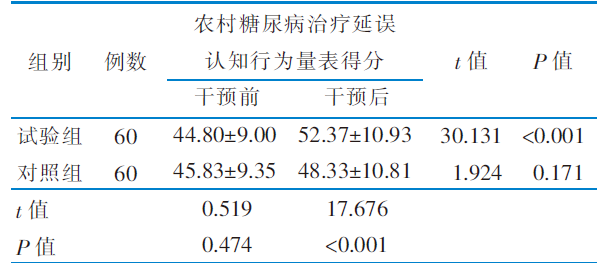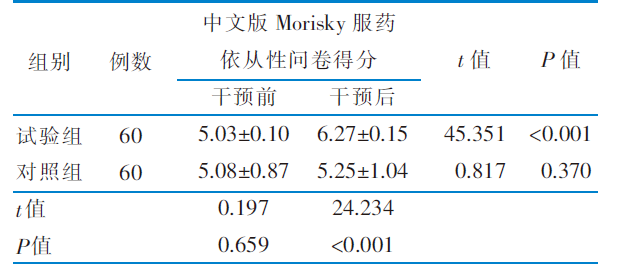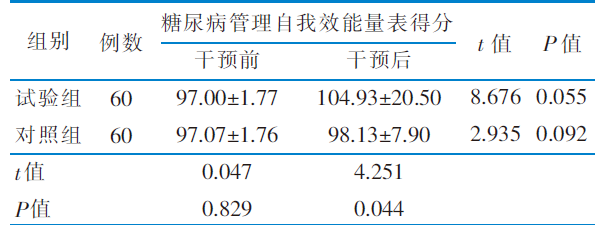


中华护理杂志 ›› 2022, Vol. 57 ›› Issue (9): 1113-1119.DOI: 10.3761/j.issn.0254-1769.2022.09.013
收稿日期:2021-10-13
出版日期:2022-05-10
发布日期:2022-05-12
通讯作者:
周郁秋,E-mail: hlxzyq@126.com作者简介:贾红红:女,硕士(博士在读),副教授,教研室主任,E-mail: 5302595@qq.com
基金资助:
JIA Honghong( ), LIU Li, LUO Xiaoxi, ZHOU Yuqiu(
), LIU Li, LUO Xiaoxi, ZHOU Yuqiu( )
)
Received:2021-10-13
Online:2022-05-10
Published:2022-05-12
摘要:
目的 探讨认知-预警干预对农村糖尿病治疗延误患者认知行为的干预效果,旨在增进其治疗依从性。 方法 2019年10月—2020年1月便利选取黑龙江省大庆市大同区和河北省唐山市滦南县下属村的农村糖尿病治疗延误患者作为研究对象。按照随机数字表法选取试验组村和对照组村各6个,每组63例,试验组给予认知-预警干预,干预时间为2周,对照组给予常规的健康教育。通过一般情况调查表获得农村糖尿病治疗延误患者的一般人口学资料,使用农村糖尿病治疗延误认知行为量表、中文版Morisky服药依从性问卷及糖尿病管理自我效能量表评估干预前后认知行为、服药依从性和自我效能;通过采集静脉血收集空腹血糖水平。 结果 试验组和对照组最终各纳入60例,干预前两组的一般人口学资料、认知行为、服药依从性、糖尿病管理自我效能及空腹血糖水平均具有可比性。干预后试验组认知行为及服药依从性均高于对照组及干预前,差异均具有统计学意义(均P<0.05);试验组干预后糖尿病管理自我效能高于对照组,差异具有统计学意义(P<0.05);试验组干预后空腹血糖水平优于对照组,差异具有统计学意义(P<0.05)。 结论 认知-预警干预可以提高农村糖尿病治疗延误患者的认知行为水平,有助于增加农村糖尿病治疗延误患者的规范治疗。
贾红红, 刘丽, 罗小茜, 周郁秋. 认知-预警干预对农村糖尿病治疗延误患者的效果研究[J]. 中华护理杂志, 2022, 57(9): 1113-1119.
JIA Honghong, LIU Li, LUO Xiaoxi, ZHOU Yuqiu. Effects of cognition-early warning intervention on patients with delayed treatment of diabetes in rural areas[J]. Chinese Journal of Nursing, 2022, 57(9): 1113-1119.
 |
表3 两组干预前后认知行为水平比较(分,$\bar{x}\pm s$)
Table 3 Comparison of cognitive behavioral scores before and after intervention between two groups (scores,$\bar{x}\pm s$)
 |
 |
表4 两组干预前后服药依从性的比较(分,$\bar{x}\pm s$)
Table 4 Comparison of medication compliance before and after intervention between two groups (scores,$\bar{x}\pm s$)
 |
 |
表5 两组干预前后糖尿病管理自我效能得分比较(分,$\bar{x}\pm s$)
Table 5 Comparison of diabetes management self-efficacy scores before and after intervention between two groups(scores,$\bar{x}\pm s$)
 |
 |
表6 两组干预前后空腹血糖水平的比较(mmol/L,$\bar{x}\pm s$)
Table 6 Comparison of fasting glucose levels before and after intercention between two groups(mmol/L,$\bar{x}\pm s$)
 |
| [1] |
Bommer C, Heesemann E, Sagalova V, et al. The global economic burden of diabetes in adults aged 20-79 years:a cost-of-illness study[J]. Lancet Diabetes Endocrinol, 2017, 5(6):423-430.
DOI URL |
| [2] | 倪叶彬, 陈亚梅, 朱晓萍, 等. 糖尿病患者围手术期血糖管理的证据总结[J]. 中华护理杂志, 2021, 56(7):1079-1085. |
| Ni YB, Chen YM, Zhu XP, et al. Evidence summary for management of perioperative blood glucose in patients with diabetes mellitus[J]. Chin J Nurs, 2021, 56(7):1079-1085. | |
| [3] |
Wang LM, Gao P, Zhang M, et al. Prevalence and ethnic pattern of diabetes and prediabetes in China in 2013[J]. JAMA, 2017, 317(24):2515-2523.
DOI URL |
| [4] |
Wändell PE, Carlsson AC, Gåfvels C, et al. Measuring possible effect on health-related quality of life by tactile massage or relaxation in patients with type 2 diabetes[J]. Complement Ther Med, 2012, 20(1/2):8-15.
DOI URL |
| [5] |
Hu DS, Fu PY, Xie J, et al. Increasing prevalence and low awareness,treatment and control of diabetes mellitus among Chinese adults:the InterASIA study[J]. Diabetes Res Clin Pract, 2008, 81(2):250-257.
DOI URL |
| [6] | 中华医学会糖尿病学分会. 中国2型糖尿病防治指南(2020年版)[J]. 中华糖尿病杂志, 2021, 13(4):317-319. |
| Chinese Diabetes Society. Guideline for the prevention and treatment of type 2 diabetes mellitus in China(2020 edition)[J]. Chin J Diabetes Mellitus, 2021, 13(4):317-319. | |
| [7] | Li YZ, Teng D, Shi XG, et al. Prevalence of diabetes recorded in mainland China using 2018 diagnostic criteria from the American Diabetes Association:national cross sectional study[J]. BMJ, 2020, 369:m997. |
| [8] | 姜海强, 田园梦, 井丽, 等. 辽宁省≥40岁农村糖尿病患者知晓率与治疗率和控制率现状及影响因素调查研究[J]. 中国预防医学杂志, 2020, 21(8):868-873. |
| Jiang HQ, Tian YM, Jing L, et al. The awareness,treatment and control of patients with type 2 diabetes aged 40 years and over in rural areas of Liaoning and its influencing factors[J]. Chin Prev Med, 2020, 21(8):868-873. | |
| [9] | American Diabetes Association. The 2020 standards of medical care in diabetes[J]. Diabetes Care, 2020, 43:S1-S212. |
| [10] |
Eliaschewitz FG, Barreto T. Concepts and clinical use of ultra-long basal insulin[J]. Diabetol Metab Syndr, 2016, 8:2.
DOI PMID |
| [11] |
Party MOTW, Barker P, Creasey PE, et al. Peri-operative management of the surgical patient with diabetes 2015:association of Anaesthetists of Great Britain and Ireland[J]. Anaesthesia, 2015, 70(12):1427-1440.
DOI PMID |
| [12] | Sonne DP, Hemmingsen B. Comment on American diabetes asso-ciation.Standards of medical care in diabetes-2017[J]. Diabe-tes Care, 2017, 40(Suppl 1):S1-S135. |
| [13] | Orji R, Vassileva J, Mandryk R. Towards an effective health interventions design:an extension of the health belief model[J]. Online J Public Health Inform, 2012, 4(3):4321. |
| [14] |
Cleary A, Dowling M. Knowledge and attitudes of mental health professionals in Ireland to the concept of recovery in mental health:a questionnaire survey[J]. J Psychiatr Ment Health Nurs, 2009, 16(6):539-545.
DOI URL |
| [15] | 贾红红, 霍桂霞, 王海丽, 等. 农村糖尿病诊治延误患者认知行为的调查研究[J]. 中华护理杂志, 2021, 56(1):91-96. |
| Jia HH, Huo GX, Wang HL, et al. Study on the status of cognitive behaviour for delayed diagnosis and treatment in diabetes patients in rural areas[J]. Chin J Nurs, 2021, 56(1):91-96. | |
| [16] |
Jia HH, Liu L, Huo GX, et al. A qualitative study of the cognitive behavioral intention of patients with diabetes in rural China who have experienced delayed diagnosis and treatment[J]. BMC Public Health, 2020, 20(1):478.
DOI URL |
| [17] | 翁艳君, 赵豫梅, 刘伟军, 等. 中文版8条目Morisky服药依从性量表在2型糖尿病患者中的信效度评价及应用研究[J]. 中华临床医师杂志(电子版), 2018, 12(8):445-450. |
| Weng YJ, Zhao YM, Liu WJ, et al. Reliability and validity of Chinese version of 8-item Morisky medication adherence scale in patients with type 2 diabetes[J]. Chin J Clin(Electron Ed), 2018, 12(8):445-450. | |
| [18] | 彭鑫, 李燕, 崔焱, 等. 饮食干预对2型糖尿病患者自我效能及代谢控制的效果研究[J]. 中华现代护理杂志, 2010, 16(14):1628-1630. |
| Peng X, Li Y, Cui Y, et al. Research of dietary intervention on self-efficacy and metabolic control of patients with type 2 diabetes[J]. Chin J Mod Nurs, 2010, 16(14):1628-1630. | |
| [19] |
Zhang YF, Gu YY, Ren HH, et al. Gut microbiome-related effects of berberine and probiotics on type 2 diabetes (the PREMOTE study)[J]. Nat Commun, 2020, 11(1):5015.
DOI URL |
| [20] | 赵明明, 王英南, 赵国军, 等. 正念减压疗法结合微课堂为主的教育对糖尿病腹腔镜阑尾切除术患者并发症知识掌握率的影响[J]. 中国实用护理杂志, 2021, 37(4):268-273. |
| Zhao MM, Wang YN, Zhao GJ, et al. Influence of mindfulness-based stress reduction plus micro-class education on the complications and knowledge mastery rate in laparoscopic appendectomy patients with diabetes mellitus[J]. Chin J Pract Nurs, 2021, 37(4):268-273. | |
| [21] |
Tanaka S, Langer J, Morton T, et al. Developing a health economic model for Asians with type 2 diabetes based on the Japan diabetes complications study and the Japanese elderly diabetes intervention trial[J]. BMJ Open Diabetes Res Care, 2021, 9(1):e002177.
DOI URL |
| [22] | 郑丽, 王光华, 鲁晶晶, 等. 微信群健康教育对糖尿病患者疾病认知及健康行为的影响[J]. 中国健康教育, 2021, 37(2):183-186. |
| Zheng L, Wang GH, Lu JJ, et al. The impact of WeChat group health education on disease cognition and health behaviors of diabetic patients[J]. Chin J Heal Educ, 2021, 37(2):183-186. | |
| [23] | 郑文娟, 戚瑞, 王丹, 等. 基于健康信念模型理论的中老年2型糖尿病患者服药依从性影响因素分析[J]. 实用预防医学, 2021,28(8):991-994. |
| Zheng WJ, Qi R, Wang D, et al. Factors influencing medication compliance in middle-aged and elderly patients with type 2 diabetes mellitus based on health belief model theory[J]. Pract Prev Med, 2021,28(8):991-994. | |
| [24] |
Guénette L, Breton MC, Guillaumie L, et al. Psychosocial factors associated with adherence to non-insulin antidiabetes treatments[J]. J Diabetes Complications, 2016, 30(2):335-342.
DOI URL |
| [25] | Tan M, Hu XY. A cross-sectional survey of factors related to medication non-adherence among elderly patients with diabetes in Western China[J]. Trauma Treat, 2018, 7(1):34. |
| [26] |
Choo J, Kang H. Predictors of initial weight loss among women with abdominal obesity:a path model using self-efficacy and health-promoting behaviour[J]. J Adv Nurs, 2015, 71(5):1087-1097.
DOI URL |
| [27] |
Byun DJ, Braunstein R, Flynn J, et al. Immune checkpoint inhibitor-associated diabetes:a single-institution experience[J]. Diabetes Care, 2020, 43(12):3106-3109.
DOI URL |
| [28] | 张爽, 陈影, 孙娜雅, 等. 综合运动训练对老年糖尿病患者衰弱和躯体功能的影响[J]. 中华护理杂志, 2020, 55(10):1445-1451. |
| Zhang S, Chen Y, Sun NY, et al. Effects of multi-component exercise training on frailty and physical function in elderly diabetic patients in communities[J]. Chin J Nurs, 2020, 55(10):1445-1451. | |
| [29] |
Son YJ, Won MH. Depression and medication adherence among older Korean patients with hypertension:mediating role of self-efficacy[J]. Int J Nurs Pract, 2017, 23(3):e12525.
DOI URL |
| [30] | 梁芳, 夏慧玲, 江月英. 健康教育对老年2型糖尿病患者自我效能及生存质量的影响[J]. 中国老年学杂志, 2015, 35(3):619-621. |
| Liang F, Xia HL, Jiang YY. Effects of health education on self-efficacy and quality of life of elderly patients with type 2 diabetes mellitus[J]. Chin J Gerontol, 2015, 35(3):619-621. | |
| [31] | 姚海艳, 余桂芳, 夏敏, 等. 糖尿病慢性并发症模拟体验教育的效果研究[J]. 护理研究, 2019, 33(17):3084-3087. |
| Yao HY, Yu GF, Xia M, et al. Effect study on simulated experiencing education in chronic complications of diabetes[J]. Nurs Res China, 2019, 33(17):3084-3087. | |
| [32] |
Dendup T, Feng XQ, Clingan S, et al. Environmental risk factors for developing type 2 diabetes mellitus:a systematic review[J]. Int J Environ Res Public Health, 2018, 15(1):78.
DOI URL |
| [1] | 吴月红, 梁红霞, 席芳, 李成, 李莹莹, 贾育萌, 郑云云, 冯珍珍. 体外膈肌起搏预防无创机械通气患者膈肌功能障碍的效果研究[J]. 中华护理杂志, 2022, 57(9): 1029-1034. |
| [2] | 王子安, 刘欣, 张茜, 俞梦盈, 郑贝贝, 陆骏, 陈婷婷. 经皮冠状动脉介入治疗术后患者恐动症水平变化轨迹研究[J]. 中华护理杂志, 2022, 57(9): 1035-1041. |
| [3] | 邓雁, 余琼, 武福姣, 方亮. 基于自我效能理论的护理干预对食管癌根治术后患者的影响[J]. 中华护理杂志, 2022, 57(9): 1042-1047. |
| [4] | 成磊, 钱佳艺, 段明霞, 黄海英, 王颖雯. 专业照护者感知的癌症患儿向成人过渡影响因素的质性研究[J]. 中华护理杂志, 2022, 57(9): 1048-1053. |
| [5] | 孙艳霞, 李莹, 刘明月, 郭丹丹, 李敏. 宫颈癌患者性健康护理培训方案的构建[J]. 中华护理杂志, 2022, 57(9): 1054-1060. |
| [6] | 胡丽莎, 彭红华, 米元元, 曹咪, 胡敏, 祝玲, 喻红君, 彭淑华. 肿瘤靶向治疗患者皮肤不良反应预防及管理的证据总结[J]. 中华护理杂志, 2022, 57(9): 1061-1069. |
| [7] | 孙倩倩, 叶红芳, 杨莉. 接纳与承诺疗法对乳腺癌患者干预效果的Meta分析[J]. 中华护理杂志, 2022, 57(9): 1070-1078. |
| [8] | 李静, 侯云霞, 强万敏. 癌症患者非计划性再入院风险预测模型的范围综述[J]. 中华护理杂志, 2022, 57(9): 1079-1087. |
| [9] | 孟祥敏, 王倩, 闫荣, 林雨婷, 丁敏. 结直肠癌患者报告结局评估工具及临床应用的研究进展[J]. 中华护理杂志, 2022, 57(9): 1094-1099. |
| [10] | 周红琴, 陈秀萍, 诸纪华, 夏姗姗, 金陈娣, 盛美君, 罗飞翔, 谢王芳, 左泽兰, 胡静, 刘丽丽, 浦凯. 儿科ICU护士对每日唤醒患儿的知信行现状调查[J]. 中华护理杂志, 2022, 57(9): 1100-1104. |
| [11] | 蒋琪霞, 唐永利, 洪艳燕, 匡丹, 王静, 展颖颖, 潘迎春, 高艳红, 郝景平, 陈锐, 刘海燕, 俞萍, 蔡蕴敏, 黄玲, 王祖晶. 50所医院老年患者皮肤损伤现状及危险因素分析[J]. 中华护理杂志, 2022, 57(9): 1105-1112. |
| [12] | 张毅, 汪健健, 邓艳红, 陈章群, 罗姜, 彭德珍, 赵丽萍. 护士人文素养自评量表的研制及信效度检验[J]. 中华护理杂志, 2022, 57(9): 1120-1128. |
| [13] | 吴海燕, 王淑芹, 郭琪, 张春艳, 贾燕瑞, 孙兵. 1例肾病综合征合并肺孢子菌及巨细胞病毒肺炎患者的护理[J]. 中华护理杂志, 2022, 57(9): 1129-1133. |
| [14] | 张晓梅, 秦毅, 陈瑜, 王伶俐, 李静逸, 王娅. 经中心静脉通路装置采血的最佳证据总结[J]. 中华护理杂志, 2022, 57(9): 1134-1140. |
| [15] | 赵洁, 常红, 李佩佩, 张欣悦. 可穿戴设备在脑卒中危险因素监测及风险预测中的研究进展[J]. 中华护理杂志, 2022, 57(9): 1141-1146. |
| 阅读次数 | ||||||
|
全文 |
|
|||||
|
摘要 |
|
|||||